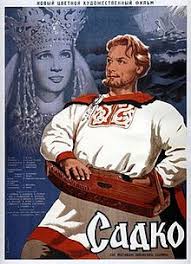
After being at sea Sinbad (Sergey Stolyarov) returns to his homeland of Copasand. When Sinbad first landed he met Lubiria (Alla Larionova). He immediately falls in love with her. She needs time to decide if she loves him. Giving her space he wanders around the city. Sinbad notices that rich merchants have most of the wealth in the city and have exploited the poor. Realizing that most of the city is unhappy he proposes to the rich merchants that they provide him with ships and whatever else is needed so that he and a crew can travel to find the legendary Bird of Happiness. The merchants aren’t interested in anything Sinbad has to say.
Feeling a little dejected Sinbad sits by the sea and plays his harp. One of Neptune’s daughters (Ninel Myshkova) hears his singing and approaches him. He tells her of his problems with the merchants and of his desire to help his people find happiness. She tells him to take a boat out into the water and net for fish. She will provide his net with golden fish.
Sinbad then goes to the merchants and proposes to them that if he can catch golden fish they will agree to open their warehouses and provide him with everything he needs and give the poor their goods. At first the merchants cringe from the prospect of losing their goods but then they figure that Sinbad will not be able to catch golden fish so they agree. Sinbad does indeed, with the help of Neptune’s daughter, catch golden fish and the merchants give him the keys to their warehouses. Sinbad opens the warehouses and everybody parties.
Sinbad finds that not everyone was able to benefit from the merchant’s wares and since everything was used up he has no money to build ships and make his journey. Neptune’s daughter comes to the rescue again and turns the golden fish to real gold. Sinbad has his ships built and with a crew sets sail saying goodbye to Lubiria and promising to return.
Sinbad journeys to many lands looking for the bird of happiness. They are attacked by a group of barbarians. Sinbad and his men manage to get away and abscond with the ruler’s white horse. In India he hears of a bird owned by the Maharaja (Mikhail Astangov) that may be the bird of happiness. Sinbad uses the purloined horse as a lure to try to trade it with the Maharaja for the bird. The Maharaja proposes a game of chess to see who will end up with both the horse and the bird. Sinbad agrees, however, the Maharaja is not as trustworthy as he should be and the bird is not exactly what it is reported to be.
“The Magic Voyage of Sinbad” AKA “Sadko” was released in 1953 and was directed by Aleksandr Ptushko. It is a Russian film based on an opera by Nikolai Rimsky-Korsakov. The opera is based on a Russian epic poem. The film was first released in the U.S. in 1953 with English subtitles.
In 1962 it was dubbed into English and rereleased, in a shorter version, by Roger Corman under the title “The Magic voyage of Sinbad”. Most of the deleted scenes were songs but there’s still quite a bit of dancing in the film. A narration was added. The name of the hero was changed from Sadko to Sinbad and many of the other names of people and locations were Americanized. It is a Russian fantasy family film that Roger tried to turn into a sword and sandal film with dubious results.
Roger charged Francis Ford Coppola to adapt the script to a more American style. There was criticism of the film that the English dubbing made the film campy. It was lampooned by MST3K in 1993. The Russian version of the film is out there somewhere. I believe it is available on DVD from RusCiCo.
I haven’t seen the original Russian version of the film. I hear that it is much better than the American version. It wouldn’t surprise me. The American version is lacking in any charm that a fantasy film should have. The film has lavish sets and a few interesting visuals, especially when Sinbad is in Neptune’s city, but most of the film is just uninteresting. The movie was marketed in the U.S. for children. Even then the only part that would be interesting for them is the undersea portion of the film. If you’re looking for a mild family film this is fine but it’s not enchanting. At least not the American version.

